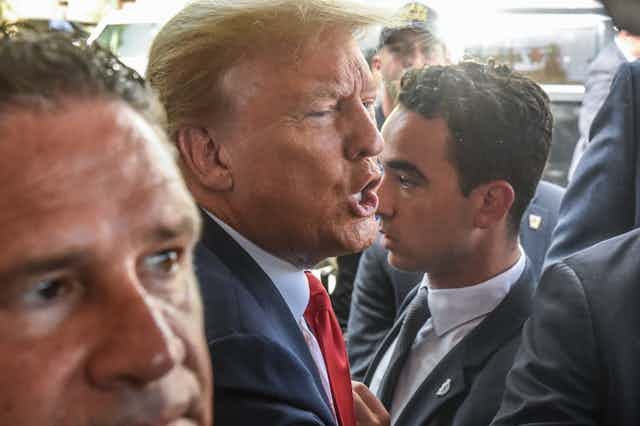Most commentators who have discussed Donald Trump’s pending criminal trials in New York, Florida and – with the late-day revelation on Aug. 1, 2023, that he has been indicted by a Washington, D.C., grand jury – in the nation’s capital, have concluded that those trials would require his presence. And that would compromise his ability to campaign vigorously for the Republican nomination and the presidency.
The U.S. Constitution protects defendants’ rights to be present at their criminal trials, prohibiting the government from holding trials against a defendant in the defendant’s absence. This rule differentiates the United States from other democracies that allow criminal trials to be held in the absence of the accused. For example, Italy tried and convicted Amanda Knox without her presence in Italy for the murder of her roommate Meredith Kercher. The conviction was later reversed.
And in federal prosecutions, a federal rule of criminal procedure appears to require the defendant to attend the entire trial. But that still doesn’t mean a defendant will turn up in court day after day.
In Trump’s case, it raises the question: Could the former president boycott his trials?

Federal prosecutions
According to Rule 43 of the Federal Rules of Criminal Procedure, the defendant “must be present” at the arraignment, at the time of the plea, at every stage of the trial including the impaneling of the jury and the return of the verdict, and at sentencing. This rule embodies the defendant’s constitutional right to be present at trial. And under U.S. Supreme Court precedents that interpret Rule 43, a defendant absolutely must be present at the commencement of a federal criminal trial.
But after a trial begins, many courts have recognized the defendant’s right to voluntarily “be absent” from the rest of the trial by waiving their right to be present. At the very least, several courts have acknowledged that the trial judge has the discretion to permit the defendant’s absence. These decisions address the defendant’s knowing waiver of his constitutional right to be present at his trial.
In addition, they interpret an exception to federal Rule 43 that allows defendants to waive their rights to be present at a trial “when the defendant is voluntarily absent after the trial has begun, regardless of whether the court informed the defendant of an obligation to remain during trial.”
At least one federal court has held that a federal trial begins no later than the day of jury selection.
So as long as Trump knowingly waives his right to be present at his own criminal trial, the presiding judge may agree that his unique circumstances – running for the presidency – constitute sufficient grounds to acknowledge and approve a waiver.
State prosecutions
Similarly, where Trump faces state charges, in New York and potentially in Georgia, both states allow for a voluntary waiver by the defendant of their right to attend their criminal trial. The Georgia and New York state constitutions and both states’ laws protect a defendant’s right to be present at all stages of a criminal trial. They also allow for the defendant to waive this right, as long as the waiver is undertaken voluntarily.
That means Trump could not hold up a criminal trial by refusing to attend, since courts typically continue such trials in the public interest even in the voluntary absence of the defendant.

Potential damage
Any time a defendant refuses to attend his own criminal trial, however, there may be consequences.
For example, the sentencing judge may interpret a defendant’s refusal to attend as an act of disrespect for the court. Or, in the case of a jury trial, jurors may be rankled by the defendant’s voluntary absence.
As a scholar of constitutional law, I have no doubt that Donald Trump’s lawyers will advise him to attend. But none of these factors may matter to the former president, who seems focused most intently on delegitimizing the prosecutions as politically driven persecutions.
Trump may not be able to sit through day after day of a criminal trial. Given what is known about his short attention span, such an outcome seems highly unlikely.
Even if he is able to absent himself from one or more of his pending trials voluntarily, he could and likely will argue that he faces a Hobson’s choice: attend the trial and lose the presidency, or boycott the trial and lose his freedom.
Many of his supporters will reject either outcome.


